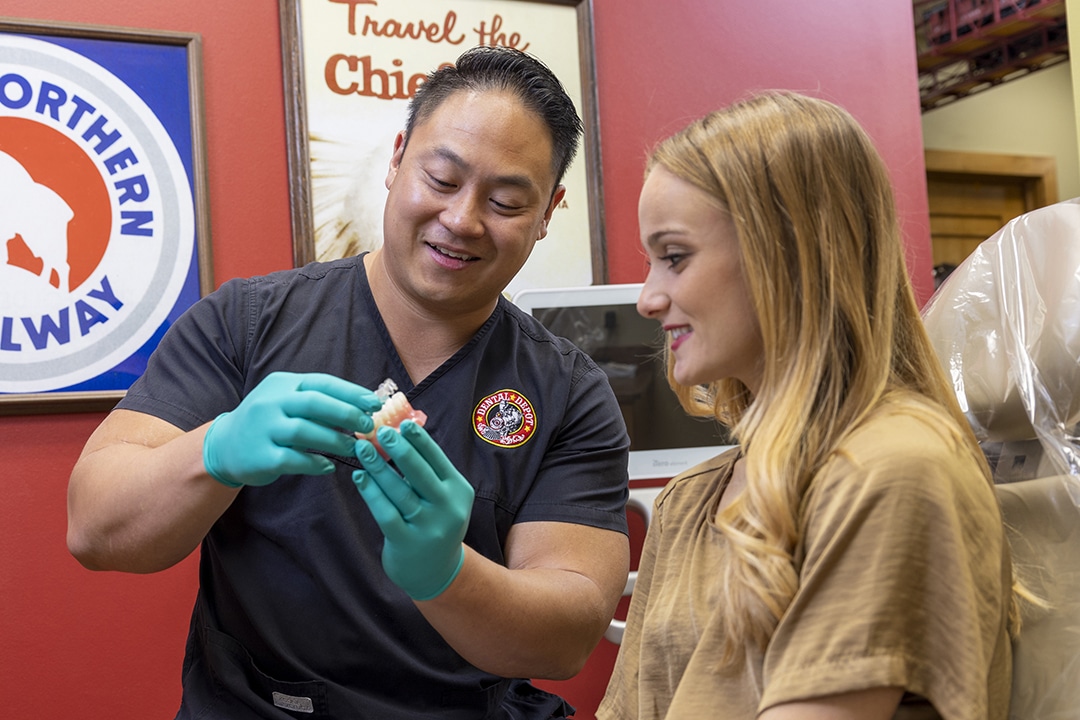Restorations like dental bridges and crowns play a crucial role in keeping your smile healthy, strong, and fully functional. Whether you’re dealing with misshapen, damaged, or decayed teeth—or need to replace missing teeth—these solutions help preserve the natural alignment of your jaw while preventing future issues like infection or bone loss.
At Dental Depot Yukon, we use high-quality materials and expert techniques to create durable, natural-looking restorations that blend seamlessly with your smile. Ready to restore your teeth and protect your oral health? Schedule your consultation today!

Crowns and bridges do more than just improve the look of your smile—they restore oral health and function while preventing further damage. Unlike bones, teeth can’t heal themselves, so once a tooth is cracked, chipped, or decayed, it needs protection. Without treatment, damage can expose sensitive areas to bacteria, increasing the risk of infections, abscesses, or even extractions.
At Dental Depot in Yukon, we provide high-quality crowns and bridges to help safeguard your teeth, prevent complications, and keep your smile strong. Schedule your appointment today and take the next step toward lasting oral health!
Dental crowns are custom-made, tooth-shaped caps that cover damaged teeth or replace missing ones. Unlike fillings, crowns provide full coverage above the gum line, reinforcing weak teeth and restoring their function. They can also be attached to dental implants for a secure, natural-looking replacement.
Beyond protection, crowns also enhance your smile’s appearance by correcting misshapen, discolored, or severely damaged teeth—giving you both strength and aesthetics in one solution.
At Dental Depot in Yukon, we use high-quality materials to craft durable, natural-looking crowns that blend seamlessly with your smile. Schedule a consultation today to see if a crown is the right solution for you!
Dental bridges are a proven way to replace one or more missing teeth, restoring both function and confidence in your smile. These restorations consist of a row of connected crowns, anchored by either natural teeth or dental implants to provide a secure, lasting fit. With a bridge, you can eat, speak, and smile comfortably without worrying about gaps in your teeth.
At Dental Depot in Yukon, we customize your bridge to match your natural teeth, ensuring a seamless look and feel. Schedule a consultation today to find the best option for restoring your smile!
At Dental Depot Yukon, we make it easy to restore your smile with affordable, high-quality dental care. With convenient scheduling and flexible payment options—including SoonerCare and CareCredit—getting the treatment you need has never been simpler.
Don’t let tooth damage or loss keep you from feeling your best. Schedule your appointment today and let us help you get back to smiling with confidence!
A crown is used to cap a decayed, damaged, or misshapen tooth at the gum line or to cover a dental implant. A bridge is a set of crowns held together.
Crowns are ideal for teeth that:
Crowns can also be used to anchor dental bridges.
A bridge connects multiple crowns to fill gaps where multiple teeth are missing. Bridges can be attached to adjacent natural teeth or implant-supported. Once placed, a bridge looks, feels, and functions like natural teeth.Bridges are ideal for people who:
The dentists and specialists at Dental Depot can help you determine if a crown or bridge is right for you.
Dental bridges and crowns are not permanent restoration solutions and will need to be replaced eventually. They may also need to be replaced if they become loose or damaged. However, most crowns and bridges are designed to last anywhere from 5 to 15 years or longer, and with proper dental hygiene, including daily brushing and flossing and bi-annual dental check-ups, you can help to extend the longevity of your bridges and crowns.
Signs that your crown or bridge needs to be replaced include:
Bone loss and deterioration in the jaw, or atrophy, occurs where there is nothing to stimulate the jaw, such as a tooth root. Since traditional dental bridges sit above the gum line, they cannot correct bone loss in the jaw. They can, however, keep your natural remaining teeth from shifting, preserving the alignment and structure of your jaw and facial bones so you can still chew, eat, and smile normally.
Implant supported bridges, which attach to small titanium screws placed in the jaw, can help correct bone loss in the jaw, because dental implants act like tooth roots, fusing to the jaw bone.
Crowns and bridges might fall out or break for a variety of reasons. If this happens, it is important that you call your dentist as soon as possible to schedule an appointment; a broken or missing crown or bridge can leave your mouth and teeth susceptible to infection, decay, and shifting. If possible, bring the crown or bridge to the appointment so the dentist can determine if it is still usable. If it is, the dentist may be able to simply reattach it as opposed to creating you an entirely new one. If it isn’t, you may need to have a new crown or bridge made.
A crown refers to a tooth-colored cap that corrects an uneven or chipped tooth. This can be cosmetic or restorative and is fitted to a tooth with an existing root structure.
A dental implant crown is restorative and serves as a replacement for an entire tooth. Dental implant crowns are artificial teeth that are attached to an abutment, which protrudes out of the gum. The abutment itself is attached to a dental implant, which is a small titanium screw implanted into the jaw bone and which acts as a tooth root.
Patients also have options for what materials are used to fabricate their crowns or bridges. Common materials include ceramic, porcelain fused to metal, porcelain, composite resin, and metal alloys. Metals are ideal for budget-conscious patients or replacing teeth at the back of the mouth, while porcelain is ideal for those who want a natural dental restoration. Porcelain fused to metal is also popular, where porcelain serves as a natural-looking complement to your smile without sacrificing the durability of metal.
